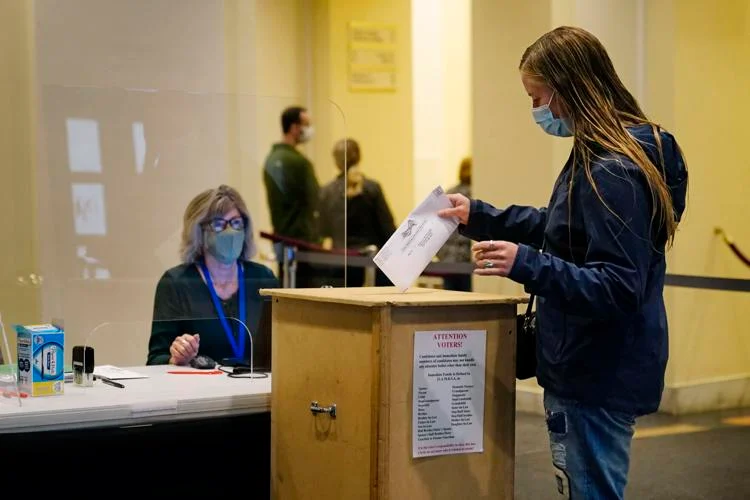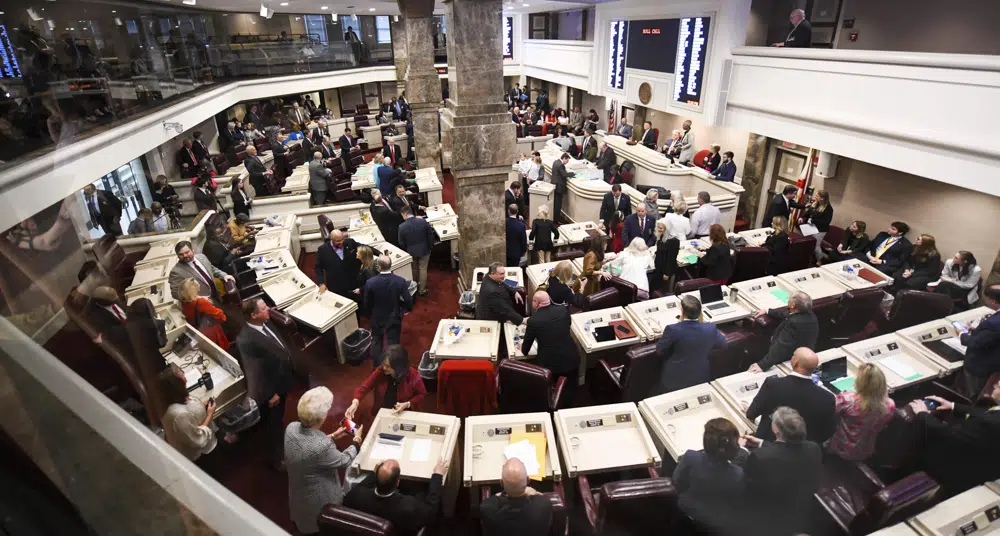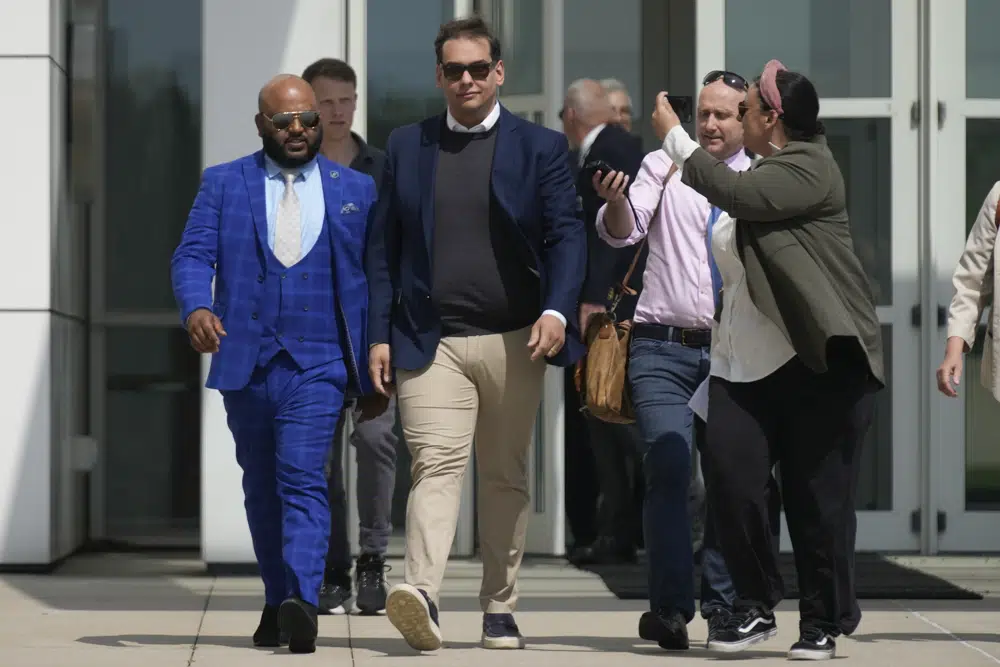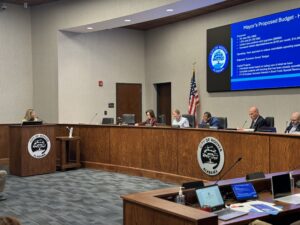House committee advances legislation to allow some habitual offenders relief from life sentences

In the past, Alabama has had a strict habitual offender law where people convicted of three felonies received life without parole. Sentencing reform in the decades past has largely done away with that 1980s sentencing standard. On Wednesday, the Alabama House Judiciary Committee advanced legislation that would allow some offenders serving life sentences under that old statute to be given a possible pathway for release. House Bill 229 (HB229) is sponsored by State Representative Chris England (D-Tuscaloosa). HB29 had been carried over in committee due to concerns that some members of the Judiciary Committee had about the legislation. “It has been on the agenda for weeks in order to do work for it,” England said. “This is one of those rare times in this building where the process worked.” “Russell Bedsole has offered two amendments,” England explained. I have also worked with the AG’s office Katherine Robinson and Bennett Wright.” England explained that his bill addresses only inmates who received life without parole sentences under the habitual offender statute. This bill is limited to those inmates given life without parole before 2000. These inmates would get a hearing before a judge to consider whether or not to commute their life sentences. “This pares it down to a group of individuals who will have to have served 23 years,” England said. England explained that Rep. Bedsole is concerned about crime victims. “The Judge will give considerable weight to any objection brought by the victims,” England said. Authorities must notify the law enforcement agency that arrested them before the inmate gets a hearing. England is a former prosecutor who currently works as an attorney for the City of Tuscaloosa. “This gives everybody in this group one shot for review, and if you are denied, there is no appeal,” England explained. “It has got a sunset provision. After five years, this section is repealed, so after five years, that group of people won’t grow.” Bedsole said. “This wasn’t something I wanted to see progress the way it was (introduced).” Bedsole is a captain in the Shelby County Sheriff’s Department. Rep. Matt Simpson offered an amendment to the bill. “I know you have moved it from 30 days to 50. Could you stretch that to 90 days?” Simpson said that as a former prosecutor, he knows how difficult it is for the DA’s office to prepare for a hearing on an old case where evidence was filed decades ago. Rep. Tim Wadsworth asked, “Is there an age factor in this bill? England replied, “No, you would already have served 23 years, so most of them are about 60 years old. At least 50.” The committee voted to adopt the Bedsole and Simpson amendments and gave HB229 an Adopted favorable report though there was no opposition. The legislation could be voted on by the full House of Representatives as early as Tuesday. Thursday will be day 20 of the 2023 Alabama Regular Legislative Session. The House convenes at 9:00 a.m. and has a lengthy special order calendar. To connect with the author of this story or to comment, email brandonmreporter@gmail.com.
Democrats oppose GOP absentee ballot bill

On May 4, the Alabama House Republicans passed legislation that would severely limit outside groups’ abilities to influence elections. The legislation makes it a felony to pass out absentee ballot applications or assist someone with filling out an absentee ballot application unless they are a family member. On Wednesday, House Democrats held a press conference to express their concerns about that legislation and promote their bills that would make it easier to participate in Alabama elections. House Bill 209 is sponsored by State Representative Jamie Kiel. The House Republicans passed HB209 Thursday on a party-line vote after voting to cloture debate. Rep. Patrick Sellers said, “Sadly, last week, the Alabama House was on the wrong side of history when it passed House Bill 209, strictly along partisan lines, which will criminalize many of those who would help the elderly and disabled with their absentee ballots. Not only is this wrong, it will have a chilling effect of causing some people not to vote at all out of fear. It reminds me of days not too long ago in our nation’s history when we had poll tests and poll taxes, which were clearly designed to keep Black people from voting. How is this different? It appears to me that this bad piece of legislation targets the elderly, the disabled, and nonpartisan civic groups that are doing everything they can to increase voter participation and voter turnout. Voting is our fundamental right to vote as a citizen. Our elections are secure and accurate. HB209 doesn’t prevent election fraud. It is a bill that suppresses the vote and makes people afraid. We need to make voting more accessible and easier, especially for those who genuinely need assistance or accommodation due to age or disability.” Rep. Thomas Jackson said, “The right to vote was initially for White men who owned property. It wasn’t until the passage of the nineteenth amendment in 1920 when women – and let me relate – white women, was able to vote, and that was half the country. My colleague spoke of poll tax and whether or not they were abolished because what we are going through now is a form of poll tax. In 1964 as a nation, we struggled and bled over this most basic right. Today we are still struggling, but we will not quit this fight because our nation is too strong, and the people are too determined, and we are founded on the bedrock and principle of government that is of the people, by the people, and for the people. For our democracy to prosper and flourish, it is vital that we increase our voting turnout, and for everything, we must have increase in participation and not suppression. Our colleagues across the aisle should be making it more accessible for people to vote rather than taking away that right that we already gained some 57 years prior. We must enact legislation for automatic registration at the age of 18, curbside voting, early voting, and guaranteed absentee voting.” Rep. Kenyatte Hassell said, “I agree that freedom is the continuous action we must all must continue to take, especially in protecting our right to vote.” “The right to vote is sacred because without this right, we cannot be free, and we cannot prosper,” Hassell said. “I and my colleagues strongly opposed House Bill 209 and voted against this,” Rep. Adline Clarke said. “We did so because it makes it a crime to assist those who need help the most, and it suppresses the vote using fear, as one of my colleagues already stated, as a tactic. It is morally wrong, and it doesn’t do anything. It doesn’t do one thing to make our elections more secure or more accurate.” HB209 does allow family members to help an elderly or disabled person to assist with absentee voting. “Not all people have families that they can rely on for help,” Clarke said. HB209 targets outside groups paying persons to canvas communities bringing absentee ballot applications to persons who likely would not vote, and then teams of canvassers assisting people in filling out those absentee ballots when they arrive. This has become part of the election process. Generally, those outside groups target communities where they know that voters will be overwhelmingly sympathetic to their party or cause. 501C3 organizations canvassing neighborhoods where they know that demographics and past voting histories are aligned with their political goals was widespread during the 2020 election, particularly in swing states like Georgia, Arizona, Pennsylvania, Ohio, and Wisconsin. “Had we not been clotured last week, Democrats were prepared to offer an amendment that would at least make House Bill 209 a little bit better,” Clarke said. “One of those amendments would allow nonprofit organizations like the League of Women Voters, the NAACP, churches, and other nonprofit 501C3 organizations to continue assisting individuals with the absentee voting process.” “House Bill 209 states that the Secretary of State, probate judges, absentee ballot election managers or their designee,” Clarke said. “Now, it is absolutely unrealistic to believe that these individuals can take up the slack for the hundreds of volunteers that assist voters in every election. It is not humanly possible and will cause a huge decrease in the number of voters who vote absentee. That is a sad thought.” Clarke warned that many people could inadvertently violate SB209 if it became law. “We envision that neighbors and many other well-intentioned people will be caught off guard if this bill passes,” Clarke said. “They will continue to be neighborly. Many will continue assisting elderly neighbors with absentee voting until they are personally notified in writing on a potential violation.” Kiel said that he drafted the legislation with the help of Secretary of State Wes Allen. Under HB209, groups would still be able to conduct voter registration drives and hand out voter registration forms. They would not be allowed to hand out absentee ballot request forms, and canvassers helping persons fill out absentee ballots would be banned. A voter who needs help could call the Secretary
House passed legislation to expand the scope of practice of optometrists

On Tuesday, the Alabama House of Representatives passed legislation that would expand local optometrists’ services. House Bill 349 (HB349) is sponsored by State Representative Danny Garrett. “1995 was the last time we expanded our optometry law in terms of scope of practice,” Garrett said. “A lot of things have changed since 1995. Nobody had smartphones then?” Garrett said that many things have also changed in optometry over the last 28 years. “What this bill does is very strictly limited,” Garrett said. “It allows optometrists to perform three procedures they are already trained to do.” Followers of the Alabama Legislature know that optometrists and ophthalmologists have been fighting for decades over the scope of practice that the state of Alabama will allow trained optometrists to do. “I have been carrying this legislation for seven years,” Garrett said. Garrett explained that this was also about giving citizens access to healthcare as 57 counties have an optometrist practicing there, but only 23 counties have an ophthalmologist. “This is a turf thing,” for the ophthalmologists Garrett said. “We haven’t seen an increase in ophthalmologists in Alabama. I have never seen a plan to expand ophthalmology in Alabama.” Garret explained that this legislation would not allow optometrists to make injections in the eyeball or perform eye surgeries. Rep. Mark Shirey is an optometrist. “We have to be trained under an ophthalmologist,” Shirey said. “The vaccines were suggested by the ophthalmologists.” Rep. Thomas Jackson said, “I have to drive 102 miles to see an ophthalmologist even though we have several optometrists who practice in Thomasville and Clarke County.” House Minority Leader Anthony Daniels said, “I have been here ten years dealing with the scope of practice, and I have not seen any expansion of access to ophthalmologists.” “When you compare this with other states, this is actually the most restrictive bill to expand the scope of practice, and they are still not satisfied,” Daniels said. “We have groups out there who are opposed to things just to be opposed to it.” “I have heard more from the opposition than I have heard in the last eight months,” Daniels continued. “There are always going to be fear tactics used. This is just how some of these folks operate.” “If you are not going to recruit more specialists to the state of Alabama, then these are the things that we are going to look at to provide access,” Daniels said. “I think it is a great piece of legislation. It is more restrictive than what I expected, but it is a start.” Daniels said that the procedures, including corrective lasers, are fairly simple. “I might be able to do that, not that I am seeking to expand the scope of practice to myself,” Daniels said, “The insurance companies that provide the malpractice insurance are not coming out against this. That they are not opposing this legislation makes me wonder what is the real issue here.” “The optometrists will tell you that there are six or seven procedures that ought to be on here,” Garrett said. “This would just allow optometrists to do what they are trained to do it, albeit on a very restricted basis.” Rep. Barry Forte said, “I represent District 84. I represent a lot of poor folks. I have one constituent; she is over 70 years old, and she has to go all the way to Dothan to get this procedure on her eyes. She is 50 miles from Dothan. She has to pay somebody to drive her all the way to Dothan to get this procedure. She lives only half a mile from the doctor’s (optometrist) office. This is the best bill I have ever seen.” Rep. Danny Crawford explained that he had to go out of state for an eye procedure because his optometrist wasn’t allowed to treat the problem. Crawford said, “It (the procedure) took ten minutes. I had to go out of state.” Rep. A.J. McCampbell said, “You may not be able to see if you wait for five or six weeks, as Rep. Crawford said. I have people who struggle to go to the grocery store. It takes my people an hour drive to get medical procedures done that they need.” The House passed HB349 83 to 6. The legislation now goes to the Senate for their consideration. Thursday will be day 20 of the 2023 Alabama Regular Legislative Session. To connect with the author of this story or to comment, email brandonmreporter@gmail.com.
Mitch McConnell opposes Alabama Republican’s blockade of military nominees over Pentagon abortion policy

Senate Republican Leader Mitch McConnell said Wednesday that he won’t support a fellow GOP senator’s blockade of military nominees, backing Democrats and Defense Secretary Lloyd Austin, who have said that the holdup is harming national security. Alabama Sen. Tommy Tuberville is objecting to the normally routine practice of confirming dozens of military nominations, a move that would force the Senate to hold potentially hundreds of votes to confirm non-controversial senior military officers. Tuberville has not backed down from his now-monthslong pledge to hold up the nominees over the Pentagon’s abortion policy, which provides travel funds and support for troops and dependents who seek abortions but are based in states where they are now illegal. “No, I don’t support putting a hold on military nominations,” McConnell told reporters, in response to a question about Tuberville’s blockade. “I don’t support that. But as to why, you’ll have to ask Sen. Tuberville.” McConnell’s comments have no practical effect on Tuberville’s holds because any senator can hold up any Senate action. But the GOP leader’s position further isolates the Alabama Republican as lawmakers and national security officials have said that the holdup may have dangerous effects. In a letter sent last week to Massachusetts Sen. Elizabeth Warren, a Democrat, Austin wrote that he has “deep concern” about the delays in confirmations. He said the Pentagon estimates that approximately 650 officers covered by the hold – those at the one-star to four-star levels – will require Senate confirmation between now and the end of the year. The delays pose “a clear risk to U.S. military readiness, especially at his critical time,” Austin wrote, adding that never before has one senator held up so many officers. The glut of vacancies would break down the department’s normal flow of leadership and breed uncertainty and confusion, he said, risking operations in “every theater, every domain, and every service.” At a hearing earlier this year, Austin defended the abortion policy by saying that tens of thousands of women in the military live and work in locations that don’t have regular reproductive health care. “This policy is based on strong legal ground,” he said. A spokesman for Tuberville said Wednesday that McConnell’s comments have not changed his position. The senator has said repeatedly that he won’t budge. “Secretary Austin thought abortion is more important than his highest-level military nominations,” he said late last month after Democrats tried to call up the nominations on the Senate floor. “Secretary Austin could end the policy today, and I would lift my hold. Secretary Austin has chosen not to do that.” Tuberville has argued that Chuck Schumer can bring the nominations to the Senate floor at any time and hold individual votes. But each nomination would require at least two votes and days of Senate time, and Democrats have argued that it would set a dangerous precedent to hold partisan votes on routine military nominations that have traditionally been unanimously approved by voice vote. Schumer said on the Senate floor Wednesday that Republicans are willing to jeopardize U.S. “standing abroad, the livelihood of service members, and our military readiness” over the issue of abortion access. “Our national security is not a bargaining chip for radical right-wing policies,” Schumer said. Republished with the permission of The Associated Press.
Consumer Price Index report shows inflation eased

Inflation cooled to 4.9% in April, down from 5% the month before, but the measure remains high. The Consumer Price Index for All Urban Consumers rose 0.4% in April on a seasonally adjusted basis. Over the last 12 months, the all-items index increased 4.9% before seasonal adjustment, the U.S. Bureau of Labor Statistics reported Wednesday. “The index for shelter was the largest contributor to the monthly all items increase, followed by increases in the index for used cars and trucks and the index for gasoline,” according to the U.S. Bureau of Labor Statistics report. Jason Furman, an economist and Harvard professor, said this month’s data was “mildly reassuring” related to what forecasters expected Tuesday and “terrifying” relative what forecasters expected in February. “On balance, the underlying detail is less worrisome than the continued very high headline number,” Furman posted on Twitter. “A bottom-up perspective suggests some slowing of inflation from its current pace.” In March, it had increased 0.1% to 5% over the previous 12 months. Republished with the permission of The Center Square
Expel George Santos? GOP leaders aren’t ready to take that step

Protecting a narrow, four-vote majority, Republican leaders in the House are making clear that they intend to let the legal process play out with New York Rep. George Santos before they take steps to force his resignation or expel him. The freshman congressman was accused Wednesday by federal prosecutors of embezzling money from his campaign, falsely receiving unemployment funds, and lying to Congress about his finances and could face up to 20 years in prison if convicted. Santos pleaded not guilty. Republican leaders, who for months have faced mounting questions about Santos after most of his campaign biography was exposed as a lie, were unmoved and brushed aside calls — including from some colleagues — that they take immediate action to push Santos out of Congress. “In America, there’s a presumption of innocence. But they’re serious charges. He’s going to have to go through the legal process,” said House Majority Leader Steve Scalise of Louisiana. Scalise was seconded by Republican Rep. Elise Stefanik of New York, the No. 3 House Republican, who sidestepped the question of whether Santos should resign. “As I’ve said from the very beginning on questions on this subject, this legal process is going to play itself out,” she said. The position Republican leaders have staked out generally follows the precedent that Congress has set in similar criminal cases over the years. The House has expelled just two members in recent decades, and both votes occurred after the lawmaker had been convicted on federal charges. But many say the narrow majority that Republicans won in the House is surely another factor in the GOP leadership’s thinking. “There are a few members of the New York delegation and a few others calling for his immediate expulsion on the Republican side, which could tilt the leadership’s hand. But given where we’re at with the debt limit and a four-vote majority, they don’t want to lose any of those votes right now,” said Casey Burgat, an assistant professor who leads the legislative affairs program at George Washington University. Santos is adamant that he will stay in Congress and seek reelection. In a press conference outside a Long Island federal courthouse, he spoke Wednesday of getting back to Washington so he could vote on a top House GOP priority, a border bill that would restrict some asylum seekers and boost border enforcement. It’s expected to be a close vote. Santos also voted last month for the House GOP bill that ties a debt limit extension to an estimated $4.8 trillion in deficit reduction over 10 years. In a dramatic flourish, Santos was the last Republican to cast a vote in favor of that bill, helping it win passage by a paper-thin margin — 217-215. While GOP leaders say the legal system needs to run its course, a few Republicans have seen enough. “The people of New York’s 3rd district deserve a voice in Congress,” tweeted Rep. Tony Gonzales, R-Texas. “George Santos should be immediately expelled from Congress and a special election initiated at the soonest possible date.” The House and the Senate have the power to punish members of their chamber for misconduct, including through expulsion. To date, according to the Congressional Research Service, 20 members have been expelled, but the large majority of them occurred at the outset of the Civil War. Half of the 20 expulsions were the result of a single vote in the Senate involving senators who represented states that had seceded from the Union but had not formally resigned. The two most recent expulsions followed convictions on public corruption charges were: —Rep. Michael J. “Ozzie” Myers, D-Penn., was convicted of bribery and conspiracy for taking money from FBI agents who posed as Arab sheiks. He was expelled in 1980 following his conviction and served more than a year in prison. —Rep. James Traficant, D-Ohio, was expelled in 2002, three months after he was found guilty of 10 federal charges, including racketeering, bribery, and fraud for taking bribes and kickbacks from businessmen and his own staff. Some lawmakers have also resigned upon being convicted of a crime, pre-empting an expulsion vote. Last year, Rep. Jeff Fortenberry, R-Neb., resigned from office after a California jury convicted him of lying to federal authorities about an illegal campaign donation from a foreign national. Two years earlier, Rep. Duncan Hunter, R-Calif., submitted his resignation about a month after pleading guilty to a charge of conspiring with his wife to steal about $250,000 in campaign funds to pay for a lavish lifestyle, from vacations to outings with friends and private school tuition. Then-President Donald Trump pardoned Hunter shortly before he left office. Trump also pardoned former Rep. Chris Collins, R-N.Y., who resigned in 2019 ahead of admitting to helping his son and others dodge $800,000 in stock market losses when he learned that a drug trial by a small pharmaceutical company had failed. More than three dozen Democratic lawmakers have signed onto a bill from Rep. Robert Garcia, D-Calif., that would expel Santos from the House. “It’s pretty clear to everyone, including his constituents, that he is a complete fraud and shouldn’t be in Congress,” Garcia said. Garcia said Kevin McCarthy is not pushing to expel Santos because he needs his vote. He urged the several Republicans from New York who have criticized Santos to sign on to the expulsion legislation. “He can barely keep his caucus together on votes, so it’s clear that he’s using George Santos’ support to keep him in leadership,” Garcia said. Republicans deny that Santos has been a distraction and say they are focused on other issues. “This place is bigger than any one member,” said Rep. Kevin Hern, R-Okla., the chairman of the powerful Republican Study Committee. Despite the reports that Santos was facing federal charges and a crush of media attention at his arraignment in New York, Republicans said there was no discussion of him during their weekly, closed-door caucus meeting on Wednesday morning. “I never heard his name mentioned once,” said Rep. Andrew Clyde, R-Ga. Republished with the permission of The Associated Press.


